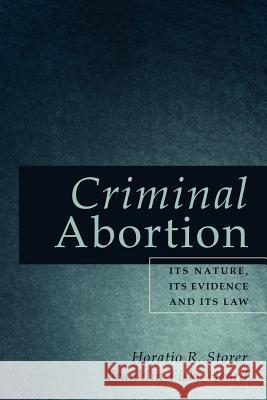Criminal Abortion: Its Nature, Its Evidence and Its Law » książka
Criminal Abortion: Its Nature, Its Evidence and Its Law
ISBN-13: 9781616192679 / Angielski / Miękka / 2012 / 226 str.
Containing both medical and legal perspectives, Criminal Abortion is an important document from the early decades of the anti-abortion crusade. Dr. Storer led the medical campaign against abortion during the second half of the nineteenth century. His efforts were supported by Heard, a notable jurist and legal scholar. The motivations for both men were primarily racist, xenophobic and sexist. They were horrified by declining birthrates among Americans of Anglo-Saxon ancestry and the influx of immigrants, many of them non-white, Catholic and Jewish. In their minds abortion in the non-immigrant community, which they attributed to modern fashion and feminism, was leading to "race suicide" and a country overtaken by "inferior races." "The legal portion of the work will probably be of the greatest practical use. This seems to be a very full and thorough collection of all the statutes and cases of value relating to the subject." --3 American Law Review 149 1868 HORATIO R. STORER 1830-1922] received his M.D. from Harvard Medical School in 1853. He specialized in gynecology in his Boston medical practice. Well-known as an anti-abortion advocate, he published widely in medical journals and wrote several popular pamphlets against abortion, including Why Not? A Book for Every Woman (1866) and Is it I? A Book for Every Man (1867). From 1865-1867 he was professor of obstetrics and medical jurisprudence at Berkshire Medical Institution and received his LL.B. from Harvard Law School in 1868. FRANKLIN FISKE HEARD 1825-1889] was a Boston lawyer and coauthor, with John William Wallace of the fourth edition of The Reporters (1882). He was the author of The Principles of Criminal Pleading (1879), Shakespeare as a Lawyer (1883) and other titles.
Containing both medical and legal perspectives, Criminal Abortion is an important document from the early decades of the anti-abortion crusade. Dr. Storer led the medical campaign against abortion during the second half of the nineteenth century. His efforts were supported by Heard, a notable jurist and legal scholar. The motivations for both men were primarily racist, xenophobic and sexist. They were horrified by declining birthrates among Americans of Anglo-Saxon ancestry and the influx of immigrants, many of them non-white, Catholic and Jewish. In their minds abortion in the non-immigrant community, which they attributed to modern fashion and feminism, was leading to "race suicide" and a country overtaken by "inferior races.""The legal portion of the work will probably be of the greatest practical use. This seems to be a very full and thorough collection of all the statutes and cases of value relating to the subject." --3 American Law Review 149 1868HORATIO R. STORER [1830-1922] received his M.D. from Harvard Medical School in 1853. He specialized in gynecology in his Boston medical practice. Well-known as an anti-abortion advocate, he published widely in medical journals and wrote several popular pamphlets against abortion, including Why Not? A Book for Every Woman (1866) and Is it I? A Book for Every Man (1867). From 1865-1867 he was professor of obstetrics and medical jurisprudence at Berkshire Medical Institution and received his LL.B. from Harvard Law School in 1868.FRANKLIN FISKE HEARD [1825-1889] was a Boston lawyer and coauthor, with John William Wallace of the fourth edition of The Reporters (1882). He was the author of The Principles of Criminal Pleading (1879), Shakespeare as a Lawyer (1883) and other titles.











